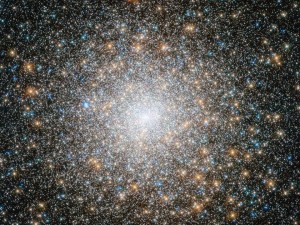
Global Cluster M15 from Hubble. Image Credit: ESA, Hubble, NASA
When she was about five, my daughter couldn’t sleep. When I checked in on her before turning in myself, I found her thoughtfully gazing at the glow-in-the-dark moon that looked back at her from the ceiling above her bed.
I asked what was on her mind she confided her conundrum: faith and science. Some people said people lived with dinosaurs and that the earth was not that old and that God created it in seven days. Science told her differently.
“I love God, but I love science, too. I don’t know which one to choose.”
Not “Good Night Moon” conversation. I assured her that she didn’t have to choose between them. That the Bible isn’t a science book. That it tells stories to help us understand that somehow, God started creation. That faith and science both search for truth and that they will both lead to God.
She slept, and I wondered what she might ask tomorrow.
Faith and Science. What do they have to say to each other? This question has been around for centuries. Are we better listeners now? I found this article, Conversations on the Intersections between Faith and Science, by Trent Gilliss on Bill Moyers.com. It is a selection of audio interviews from Krista Tippett’s NPR show, On Being. This collection provides links to her interviews with a variety of guests including two Jesuit astronomers from the Vatical Observatory and Freeman Dyson and Paul Davies who are both theoretical physicists discussing Einstein’s God. Bookmark this because the audio are fifty some minutes long, and you will want to return to listen to each of them. Unless, of course, you have a day to give to listening and pondering these questions and your own experiences of how faith and science can inform each other. Not a bad way to spend a Saturday!
